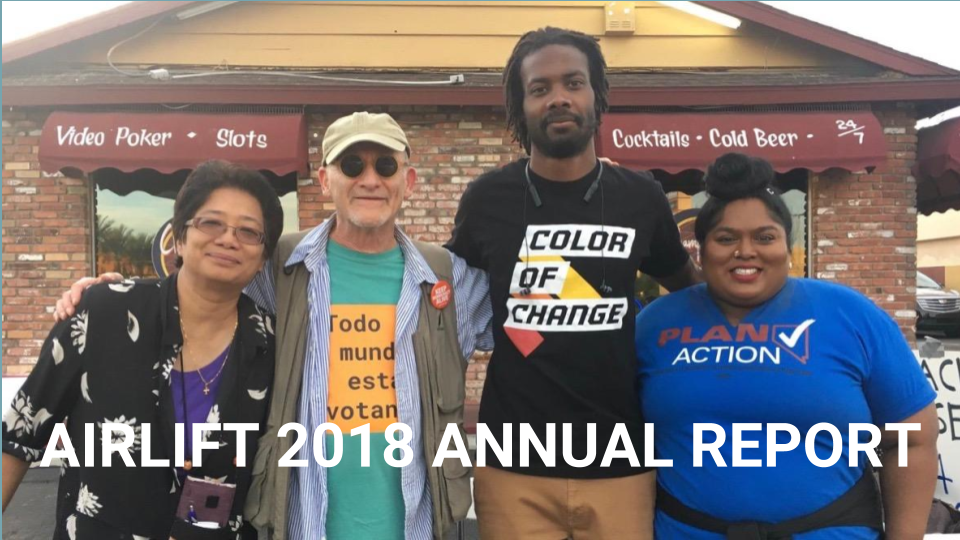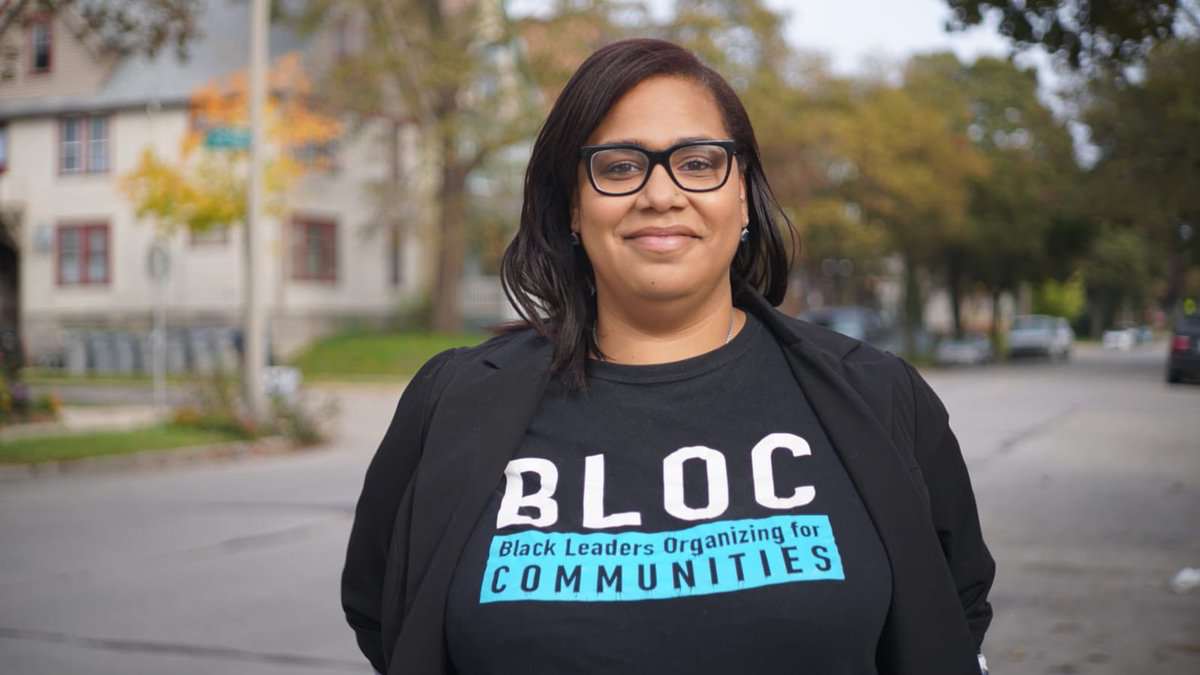Feet on the Street! Airlift founder Danny Altman with our partners at an early voting event in Las Vegas. Pictured: Vida Benavides, Win Justice, Danny Altman, Airlift, Reggie Harris, Color of Change, Amanda Khan, PLAN Action Fund.
IN 2018 Airlift turned your dollars into victories
We started Airlift because all of us are bombarded with an insane amount of political fundraising, and there is no way to know where our money is really going or how it is being used. Airlift helped 400 people in 2018 aim their political giving at long term local power building, not consultants and TV. This translated into some landscape-changing victories.
Airlift is strategic and it works
Here’s what your Airlift contributions helped to achieve:
-- Flip 21 house seats, including all 7 in California! (West by Southwest Fund)
-- Restore voting rights for 1.4 million citizens in Florida (Organize Florida)
-- Turn Nevada almost entirely Blue! (PLAN Nevada)
-- Increase early youth voting in Texas by 500% (MOVE Texas)
-- Kick Scott Walker out of office in Wisconsin (Milwaukee BLOC Action Fund)
-- Pass redistricting in Ohio, Missouri and Michigan (Lift the Midwest Fund)
-- Flip 15 Virginia house seats and win Medicaid expansion for 400,000 people (New Virginia Majority)
-- Pass automatic voter registration in Michigan and Nevada (MI-Liberation and PLAN Nevada)
-- Hire 600 organizers in Alabama who won the election for Doug Jones (Airlift special project)
DONATE
We need to keep the pressure on
We know that year-round voter engagement works--that is why we won and why we are celebrating now. If you want to help end the electoral boom and bust cycle, please consider making a big donation now to keep the feet on the street. The earlier the donation, the bigger the impact.
2019 is not an off year
For the next 18 months, the Democratic primary is going to suck up nearly all the oxygen and money, most of which will go to losing campaigns. Airlift's top recommendation for 2019 is simple: Invest early in building the strongest possible field organizations in the most important battleground states no matter who the Democratic nominee is. In order to do this, we need to raise a million dollars in 2019. This will allow us to triple the amount of money we invest in each group.
The Airlift team plans for 2019 and 2020.
Airlift is easy and strategic
Our goal is to invest where we are likely to get the biggest return. We are evaluating the groups we fund by mapping to states essential to taking back the Presidency and the Senate and keeping control of the House. Lift the Midwest was an incredibly successful special project—we raised over $70,000 for a part of the country that a lot of people had written off. There were many decisive victories in the Midwest in 2018. Not a single Republican won statewide office in Michigan, Wisconsin or Pennsylvania. We are elevating Lift the Midwest to become a fund. It will replace Network Effect, which supported more established, better funded organizations.
DONATE
Let’s get to work
1. Donate monthly Our groups are like little birds. They don't eat a lot, but they need to be fed all year round. >>>Make a recurring donation on ActBlue. You can change it at any time.
2. Throw a party for Airlift We make it easy and fun. This is our single biggest way of raising funds and extending our network. >>>Send an email to Carol Korenbrot to find out more.
3. Share Airlift with your friends, family and coworkers >>>Forward this along with a quick note to let them know that you found a consumer reports for political giving. And that mobilizing young and non-white voters made the difference in 2018, and it will in 2020.
More about Airlift
Airlift is part of a network of donor groups including Way to Win, Movement Voter Project, and Women Donors Network all sharing info and best practices and funneling money to the most effective grassroots groups around the country. Our advisors include Larry Litvak, former CFO at Working Assets and now Lecturer in Public Policy at Stanford, Matt Singer, Philanthropic Advisor to America Votes, Jason Franklin, Philanthropic Advisor to Movement Voter Project, and Becky Bond, Strategic Advisor to Bernie Sanders and Beto O'Rourke.
What makes Airlift so powerful?
We make it easy to donate strategically. You don’t have to be a member or attend meetings or spend hours researching where to give. We do that work for you. 80% of our donors go to Airlift.fund and press one button that spreads their donation across all funds. Online donations are processed through ActBlue. Checks are processed by Tides Advocacy. Airlift donations are not tax-deductible.
Where your Airlift money went in 2018
Reports from the field
Angela Lang, BLOC founder, is helping black voters in Milwaukee flex new muscles.
Lift the Midwest Fund: Milwaukee BLOC
Barely a year old, Milwaukee BLOC works in the most incarcerated zip code in the U.S. and delivers votes in neighborhoods the pros gave up on a long time ago. In a governor’s race decided by 30,000 votes, BLOC talked to 14,000 voters, helping Tony Evers win Milwaukee by 78%. Led by visionary organizer Angela Lang, BLOC calls canvassers “ambassadors,” runs silent canvasses where candidates just come to listen, and educates staff with a civics version of Jeopardy created by one of their organizers. Now they want to keep their ambassadors engaged as BLOC captains, a path to running for office.
MOVE Texas will start operations in Houston and Dallas this year.
Voter Motor Fund: MOVE Texas
MOVE San Antonio was started by 6 University of Texas students in 2013, and it rapidly became a major force in our nation’s 7th largest city. Driven by students, and now working across the state, MOVE Texas is unstoppable. They were the decisive force behind the election of a progressive mayor in 2017. They registered 30,000 new voters and distributed over 200,000 voter guides in 2018. Along the way they won paid sick leave, eliminated arrests for minor offenses and pioneered parties at the polls. The results? A 500% increase in youth turnout in early voting. On the agenda now: fighting to let young people use their student ID for voter ID, mandatory early voting at Texas colleges, and two-year tuition-free community college.
West by Southwest Fund: Communities for a New California
CNC is an independent year round phone banking and canvassing organization in the Central Valley. Their goal since 2010: expand the electorate by deeply engaging with LatinX and young voters. CNC runs five local phone banking offices that check in on their entire universe of 100,000 voters every quarter. When elections get close, they turn into a GOTV operation with bilingual teams of canvassers, peer-to-peer texting, and “chase” teams that track down people who have not turned in their absentee ballots. CNC had 35,000 direct conversations with voters in CD-10 where Josh Harder won by 10,000 votes. And 20,000 conversations in CD-21 where TJ Cox won by 900 votes. Their goal was to deliver 14,000 unlikely voters in each district.










